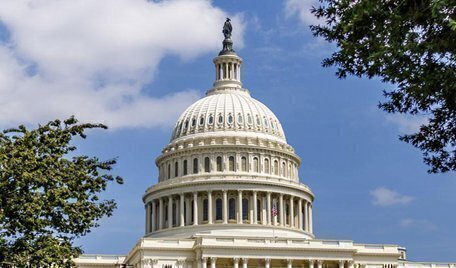On Tuesday, House Speaker Nancy Pelosi announced an impeachment inquiry would be made against President Donald Trump into allegations that he acted improperly in talks with Ukrainian leaders. So what is an impeachment inquiry and where does it fall in the range of the House’s constitutional powers?
 The Congressional Research Service (CRS) detailed the House’s impeachment role in an August 2019 research report.
The Congressional Research Service (CRS) detailed the House’s impeachment role in an August 2019 research report.
“The House impeachment process generally proceeds in three phases: (1) initiation of the impeachment process; (2) Judiciary Committee investigation, hearings, and markup of articles of impeachment; and (3) full House consideration of the articles of impeachment,” it said.
Speaker Pelosi’s announcement started the first part of that process on Tuesday, but she didn’t introduce a resolution formally launching an impeachment inquiry. “I'm announcing the House of Representatives is moving forward with an official impeachment inquiry. I'm directing our six committees to proceed with their investigations under that umbrella of impeachment inquiry,” she said. Pelosi was referring to ongoing investigations in the House’s Judiciary, Intelligence, Oversight and Reform, Foreign Affairs, Financial Services, and Ways and Means committees.
The Constitution doesn’t offer specific guidance on rules for impeachment inquiries and the House determines its own rules of parliamentary conduct. According to the CRS, the House’s rules allow for an impeachment inquiry to go forward without an initial resolution but the matter would move on the Judiciary Committee at some point. (The website Axios reported on Tuesday night that Pelosi told House members in a closed-door meeting that any potential charges from the five other committees would be sent to the Judiciary Committee.)
In the cases of Presidents Bill Clinton and Richard Nixon, the Judiciary Committee reported resolutions officially authorizing an impeachment investigation into a President’s activities, said the CRS.
What was lacking in Pelosi’s announcement, said Todd Ruger from Roll Call, was specific details about the impeachment inquiry and how it would move forward. “There was no word from Pelosi about whether the ‘official’ impeachment inquiry would mean more resources for the Judiciary Committee and the other committees looking into Trump’s actions,” Ruger said.
The second part of the House impeachment process usually resides with the Judiciary Committee, which can empower subcommittees, hold public hearings, subpoena persons and records, and incur expenses as part of the investigation. At the investigation’s end, the committee would decide if the evidence merits moving forward with the drafting of impeachment articles for the full House to consider.
The Constitution provided the impeachment process framework in 1787.
Article I, Section 2, Clause 5 of the Constitution gives the House of Representatives the sole power to bring charges against federal officers, including the President. If a majority of the House approves these charges, presented as a resolution called “articles of impeachment,” the matter is sent to the Senate.
Article I, Section 3, Clause 6 gives the Senate the power to try an official facing impeachment charges stated in the articles. In the case of the President, the Chief Justice of the United States presides over the trial. In other situations, the Senate is the judge and jury. The Senate must find the person guilty by a two-thirds voting margin; the main punishment is removal from office, and disqualification from holding future offices is also a potential punishment.
Article II, Section 4 provides the grounds for impeachment: “The President, Vice President and all civil Officers of the United States, shall be removed from Office on Impeachment for, and Conviction of, Treason, Bribery, or other high Crimes and Misdemeanors.”
Scholars Steven G. Calabresi and Michael J. Gerhardt discussed the Founders’ impeachment-process intent in an essay for our Interactive Constitution project.
"The different powers of the House and Senate further reflect the Framers’ hopes for the Senate’s disposition toward the implementation or protection of classical republican values, such as ennoblement through public service," Calabresi and Gerhardt wrote. "Even with its ‘sole’ power to impeach, the House may only initiate a legislative action but must depend on the Senate to complete the job, whether it entails enacting a law or convicting and removing a high-ranking official, such as the President, for serious misconduct in office."
The impeachment process and the super-majority Senate vote, they explained, “are designed, as James Madison explained in The Federalist No. 58 as a ‘shield to some particular interests, and another obstacle generally to hasty and partial measures.’”
In the past, three Presidents have faced the full impeachment process in the House.
In 1868, President Andrew Johnson clashed with the Radical Republicans and was accused of violating the Tenure of Office Act (a law he vetoed). The House impeached Johnson but he was found not guilty in the Senate by the slimmest of margins. (The Supreme Court later found the act unconstitutional.)
In early August 1974, the House Judiciary Committee passed three articles of impeachment against President Richard Nixon, to be presented to the entire House for a vote. On August 8, 1974, Nixon resigned before the House decided the matter.
The 1999 impeachment and trial of President Bill Clinton was related to perjury and obstruction of justice allegations. The House approved two charges, but the Senate wasn’t close to finding Clinton guilty, falling 22 votes short on one charge and 17 votes on another charge.
Scott Bomboy is the editor in chief of the National Constitution Center







